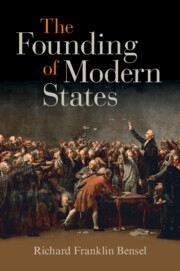Book contents
- The Founding of Modern States
- The Founding of Modern States
- Copyright page
- Dedication
- Contents
- Tables
- Boxes
- Preface
- 1 Introduction
- Part I The Founding of Democratic States
- 2 “The Rights of Englishmen” and the English Constitution
- 3 The Will of the People and the American Founding
- 4 The Declaration of the Rights of Man and of the Citizen
- Part II The Founding of Non-democratic States
- Index
3 - The Will of the People and the American Founding
from Part I - The Founding of Democratic States
Published online by Cambridge University Press: 27 October 2022
- The Founding of Modern States
- The Founding of Modern States
- Copyright page
- Dedication
- Contents
- Tables
- Boxes
- Preface
- 1 Introduction
- Part I The Founding of Democratic States
- 2 “The Rights of Englishmen” and the English Constitution
- 3 The Will of the People and the American Founding
- 4 The Declaration of the Rights of Man and of the Citizen
- Part II The Founding of Non-democratic States
- Index
Summary
English political customs, traditions, and institutions profoundly shaped the American founding, so much so that the major difference between them was that, following the break with Britain, the Americans “wrote down” those customs, traditions, and institutions into their constitutions and statutory laws.1 In 1760, both the British people and the American colonists held that the unwritten English Constitution had created and guaranteed the “rights of Englishmen.”2 This ensemble of abstract principles, maxims, and institutional relations gradually came to supersede the comparatively specific claims based on the individual charters of the separate colonies. For example, when the royal governor of Georgia rejected the man elected by the Georgia Assembly as speaker, John Zubly, in 1772, Zubly first cited the history of parliament as support for the assembly’s right to choose whomever it wanted as a presiding officer and then added: “[A]n Englishman I should think [is] entitled to English laws, which I suppose implies Legislation any where and every where in the British dominions, that this right is prior to any charter or instruction, and is held not by instructions to a Governor but is his [in this instance, the colonist’s] natural right.”3
- Type
- Chapter
- Information
- The Founding of Modern States , pp. 84 - 198Publisher: Cambridge University PressPrint publication year: 2022

